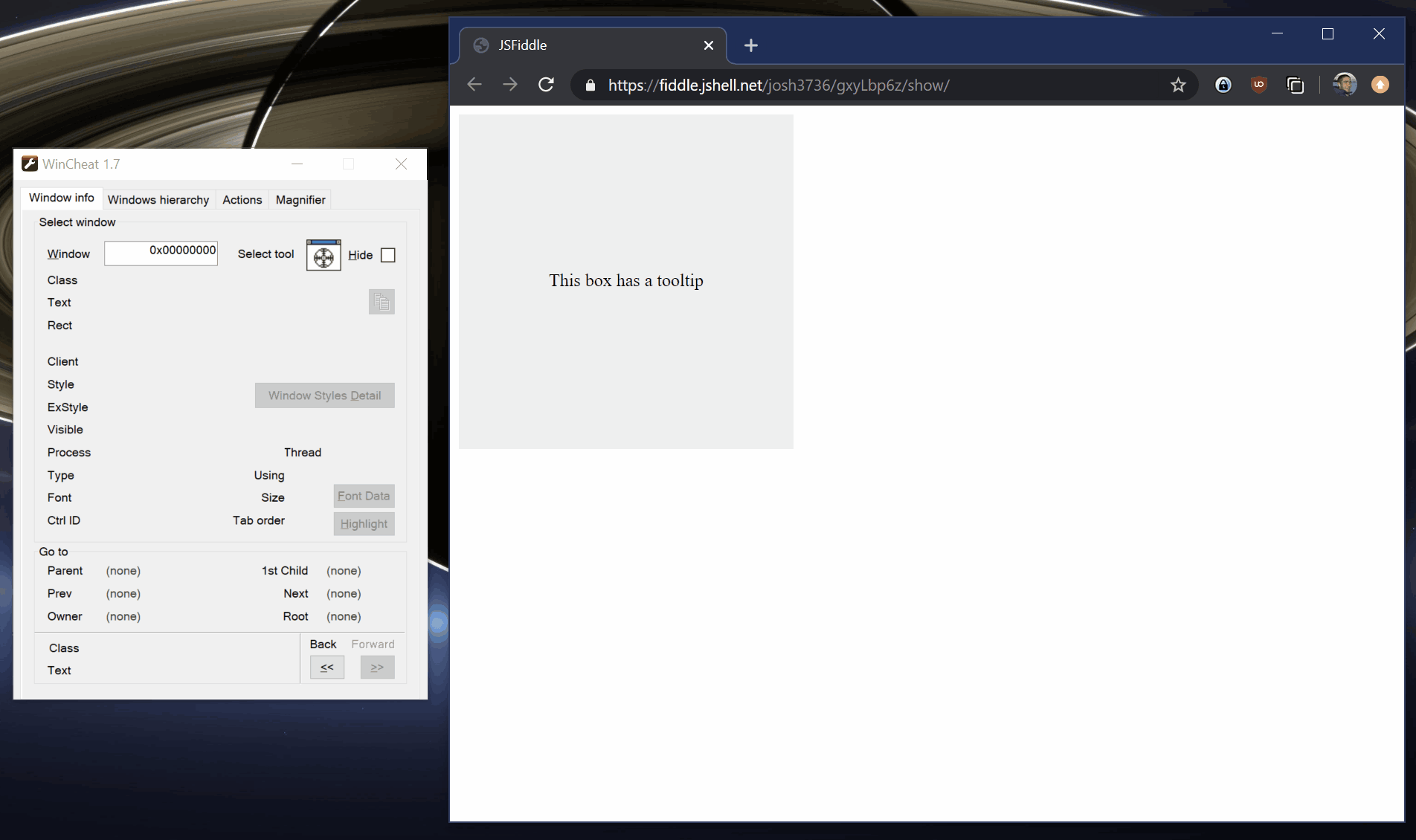How to identify which program has left a portion of its UI floating on my screen?
Solution 1
You are most likely experiencing a Chrome bug that results in undismissable tooltips.
Basically, if you hover over something on a webpage and then your mouse moves outside the window in an unexpected way (such as minimizing the window), the tooltip will appear after the window disappeared, and there is no way to dismiss the tooltip (since the source window no longer gets mouse move messages, and as far as it's concerned, you're still hovering).
To get rid of the tooltip, you can
- Find the tab it came from and just move your mouse around. The tooltip should disappear. (Unfortuantely, there's no easy way to determine which tab the tooltip came from, so you'll have to guess. It has no direct association in the window hierarchy; its parent is the desktop window.)
- If you can get the tooltip's
HWND, you can send itWM_CLOSEand it will go away. (see below) - Exit Chrome (or other offending app)
Note that this bug affects software based on Chrome as well, such as Blink-based browsers (Edge and Opera) and things built on Electron (Slack and hundreds of others).
To answer the question itself, you can find the process that owns the tooltip by using a debugging tool like Spy++ or WinCheat.
Drag the window picker tool over the tooltip and it will show you the window's details, including the owning process.

If you then go to the Actions tab, you can send the tooltip window a WM_CLOSE message and it will go away. (Be careful with this tool -- great power, great responsibility. Apps may not expect windows to be closed out from under them. Doing this doesn't appear to make Chrome crash.)
Solution 2
I noticed that what looks like a tooltip saying "Increase Indent" is floating homeless on my screen.
There are 2 possibilities:
A glitch that hasn't been redrawn correctly by the underlying window manager code
A real Window that cannot be moved/closed
A glitch that hasn't been redrawn correctly
- to remove it toggle the Show Desktop button on the far right of the taskbar.
How can I remove an unwanted fragment of old GUI on my screen? (Windows 7) - Super User shows some other possible solutions:
- change the theme of your windows from Aero to Classic and then back to Aero again.
- Start Menu > Shut Down > Switch User, On Welcome screen just log back in
As per comments you can also try:
- Restarting Windows Explorer will do the trick too, most of the time. If not, restart dwm.exe
A real Window that cannot be moved/closed
You can use Process Explorer's "Find Window's Process" feature (the crosshairs on the toolbar of the Process Explorer window). Click and drag it over the window you want to identify, and Process Explorer will highlight the process it belongs to.
Source I can't remove a tiny window, answer by cyanic
When you know which process the windows belongs to you can choose to terminate that process by using the Task Manager.
Solution 3
Use Spy ++ (SPYXX.EXE) to find this buggy program. https://docs.microsoft.com/en-us/visualstudio/debugger/introducing-spy-increment
This article should help you: https://docs.microsoft.com/en-us/visualstudio/debugger/how-to-use-the-finder-tool
Solution 4
On one occasion using the Process Explorer tip mentioned in another answer it turned out to be Visual Studio Code that owned the floater. Switching to that app & moving the mouse around cleared it up.
The Process Explorer tool worked perfectly.
I've added this as an answer because it differs from the accepted answer & some other comments about Google Chrome being the likely culprit.
Related videos on Youtube
StayOnTarget
Updated on September 18, 2022Comments
-
 StayOnTarget over 1 year
StayOnTarget over 1 yearI noticed that what looks like a tooltip saying "Increase Indent" is floating homeless on my screen. Here it is with the edge of the browser window beneath it:
It has attained nearly infinite Z-order and sits above anything else I can move around, even Task Manager. (It does not superimpose over the lock screen)
How can I figure out which program owns this, so I can terminate it? I'd prefer to do this in a minimally invasive way - ie, not just reboot.
I have already closed certain applications just by guesswork but didn't luck into the offender. (Possibly, since this seems to be a bug, closed applications didn't actually clean up properly).
Searching for "increase indent" specifically floating like this didn't turn anything up, but I was hopeful this could be a commonly known issue.
I imagine there could be some utility (built in to Windows, or 3rd party) which might let you click on any UI element and identify its process?
Edit: I found the source of the tooltip, thanks to the answer below, which was a web app running in Chrome:
-
 MC10 about 4 yearsHave you had any text editors or word processors open? There is an Increase Indent option in Microsoft Word and Google Docs, but neither of their tooltips look like that. It may be from something similar.
MC10 about 4 yearsHave you had any text editors or word processors open? There is an Increase Indent option in Microsoft Word and Google Docs, but neither of their tooltips look like that. It may be from something similar. -
 DavidPostill about 4 yearsTry Show Desktop and back again
DavidPostill about 4 yearsTry Show Desktop and back again -
 StayOnTarget about 4 years@MC10 there were some editors, but they were among the ones I tried to close.
StayOnTarget about 4 years@MC10 there were some editors, but they were among the ones I tried to close. -
 StayOnTarget about 4 years@DavidPostill that has worked - the thing is no longer on the screen! I wonder if its still in existence somewhere... clicking back through my open programs I can't find it.
StayOnTarget about 4 years@DavidPostill that has worked - the thing is no longer on the screen! I wonder if its still in existence somewhere... clicking back through my open programs I can't find it. -
 Admin about 4 yearsI have had this issue before, every time I've had the issues is because a hoverable's unhover function didn't run. Just hovering over whatever you hovered over and unhovering fixes it. This is like when you get stuck keys so you press the offending button to get the unpress function to run.
Admin about 4 yearsI have had this issue before, every time I've had the issues is because a hoverable's unhover function didn't run. Just hovering over whatever you hovered over and unhovering fixes it. This is like when you get stuck keys so you press the offending button to get the unpress function to run. -
 StayOnTarget about 4 years@CamilaHunter I have definitely seen that kind of thing before also. But in this case no amount of badgering the thing with the mouse would affect it.
StayOnTarget about 4 years@CamilaHunter I have definitely seen that kind of thing before also. But in this case no amount of badgering the thing with the mouse would affect it. -
 Asteroids With Wings about 4 yearsOff topic but it really bothers me that "Indent" is capitalised here. In my experience, that is not the Windows convention for tooltips. If you ever work out which app is responsible, please ask its authors to fix this ;)
Asteroids With Wings about 4 yearsOff topic but it really bothers me that "Indent" is capitalised here. In my experience, that is not the Windows convention for tooltips. If you ever work out which app is responsible, please ask its authors to fix this ;) -
 Mazura about 4 yearsany UI element and identify it: uBlock Origin. But while troubleshooting there should be no open web browsers.
Mazura about 4 yearsany UI element and identify it: uBlock Origin. But while troubleshooting there should be no open web browsers.
-
-
 Admin about 4 yearsRestarting Windows Explorer will do the trick too, most of the time. If not, restart dwm.exe.
Admin about 4 yearsRestarting Windows Explorer will do the trick too, most of the time. If not, restart dwm.exe. -
 StayOnTarget about 4 years@Didier I only had this problem once but if it happens again I may try that just to see. Thx
StayOnTarget about 4 years@Didier I only had this problem once but if it happens again I may try that just to see. Thx -
 Admin about 4 yearsHopefully, you won't have to... :-)
Admin about 4 yearsHopefully, you won't have to... :-) -
Andrew Savinykh about 4 yearsI'm routinely seeing those (different words, but the label looks the same) in RDP sessions.
-
Joey about 4 yearsProcess Explorer's Find Window Process may not help with things like tooltips which often are windows that are not even hit-test visible to the mouse on purpose.
-
 StayOnTarget about 4 yearsThis is exactly what happened. Thanks to this answer I discovered the source of the tooltip - which is a Chrome web app I use often. I can't yet get it to reproduce again but I don't know exactly what caused it in the first place, I suspect another program coming up and stealing focus.
StayOnTarget about 4 yearsThis is exactly what happened. Thanks to this answer I discovered the source of the tooltip - which is a Chrome web app I use often. I can't yet get it to reproduce again but I don't know exactly what caused it in the first place, I suspect another program coming up and stealing focus. -
 Admin about 4 yearsThis is a bug that happens in any Chromium-based browser, not only Chrome; I see it all the time in Vivaldi. The only way to dismiss the tooltip is either to exit the browser completely, or to hover over all the open tabs and windows until the correct one is found and the tooltip goes away.
Admin about 4 yearsThis is a bug that happens in any Chromium-based browser, not only Chrome; I see it all the time in Vivaldi. The only way to dismiss the tooltip is either to exit the browser completely, or to hover over all the open tabs and windows until the correct one is found and the tooltip goes away. -
somebody about 4 yearsanswers should be self contained, you should try to put at least a summary of the content in the link, in case e.g. the link goes dead






